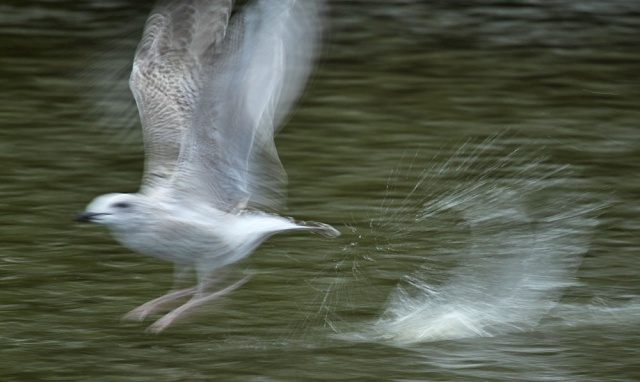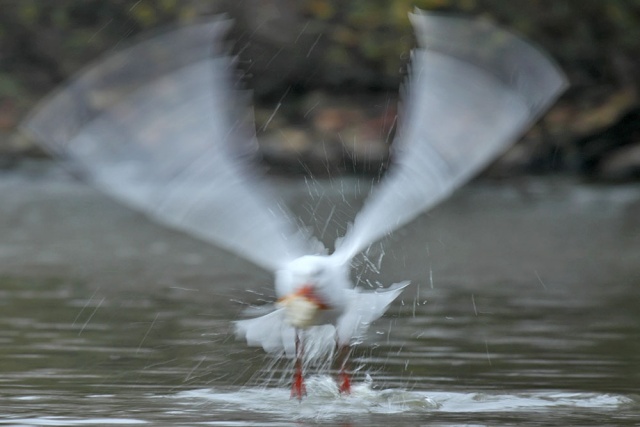A change of tactic. Having spent days struggling with the late autumn gloom and cranking the camera up to gain some sort of shutter speed, I reversed everything today. I decided to stop fighting the elements and let the light work for me. I dropped the ISO down to 100 (even in normal conditions I tend to set it at 400-640) and decided to see what I could get shooting with a slow shutter speed. The gulls were cooperative.


Camera note: all shots taken with the Canon 7D and EF 100-400mm f/4.5-5.6L USM IS lens.
claudeb
12 Nov 2011Wow, artistic. The second one looks like those photos taken on the same film with a strobe light, for research. But the third is the most artistic.
Words
12 Nov 2011Erwin, thanks!
Words
12 Nov 2011Felix, thanks! It made a change to try this. I like slow-shutter shots with plenty of action, but often the light is too good to achieve anything.
serola
14 Nov 2011Nice experiments :wizard:
Words
14 Nov 2011Sami, I did some better ones today. It was foggy!
serola
15 Nov 2011So going to have a look :up:
SittingFox
16 Nov 2011Interesting shots. Yes, the recent weather has made it necessary to think more creatively.
Words
16 Nov 2011Adele, I was getting very tired of high ISO shots which rarely gave me anything particularly interesting. These are more of a challenge, and as I'm getting to grips with the technique are producing some images.
ICU109
17 Nov 2011so it has something to do with something called ISO. hmm. know NOTHING about cameras so don't 'splain to me, jus nod n smile and say yes, kathy, it's the ISO. anyway, looks like something I would work on for hours on PaintDotNet and Photoshop to get this effect. so delicate. love it.
Words
17 Nov 2011Kathy, I won't go all technical on you, but a high ISO means the camera sensor is more sensitive to light so it's like what they used to call a 'fast film'. You use a high ISO when the light is poor so that the camera picks up more of the image. Downside is that the image can be a bit grainy.
ICU109
19 Dec 2011like keeping the lens open longer to let more light in for taking pics of non moving objects. slow shutter speed. learned that in the 80s, so I'm way behind technology. have a camera on my damn phone if that tells you anything. lol
Words
19 Dec 2011That's the theory. I'm hopeless with phones, but some of the latest ones have pretty decent cameras on them.
serola
20 Dec 2011The problem with phone cameras is that they do not have such thing as manual settings. Moreover, they have fixed aperture anyways, and therefore only thing you can try to adjust are ISO (sensitivity), which then affect to exposure time. So, for example on Android phones you may have scale between ISO 100 – 800. Then choose ISO 100 if you want longer exposure time, and vice versa. But as Words said, high ISO also means more noise aka small colorful dots as graininess. Then you can make picture more tolerable by switching to B/W.
ICU109
21 Dec 2011or sepia, I take it; I have a samsung phone. next will be an android as adobe has unleashed a new program only so far for android tablets. I doubt it will be bought anytime soon, however. gotcha on the ISO. Interesting. Photography is definitely an art and one needs so much knowledge about it but also the inborn talent you all seem to have! cheers!
Wulpen
19 Oct 2012Interesting Photos yes this has a art,and beauty to it….